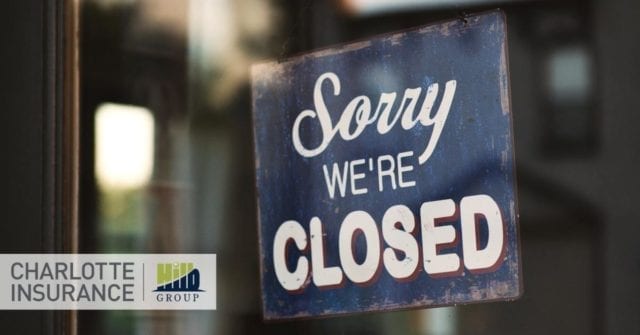Schools and businesses are closing. Events have been cancelled. Even in areas where COVID-19 hasn’t quite been felt yet, the business interruption is clear. You may be wondering if your business interruption insurance can help.
Here’s what you need to know.
Many Policies Include Standard Business Interruption Coverage
If you think you don’t have business interruption coverage at all, chances are you do, especially if you have a comprehensive insurance package for your business. Business disruption isn’t a standalone coverage you purchase separately. It’s typically included within your policy. This coverage is limited to specific types of disruptions to businesses and specific exclusions, depending on the policy.
Business Interruption Often Excluded from Coverage
First, the bad news, in most standard business interruption coverages, communicable diseases are explicitly excluded. In 2003, after the SARS outbreak, millions were paid in business interruption losses. Insurance companies quickly moved to add communicable diseases to their list of exclusions.
In the rare instance that an insurance policy does cover diseases and illnesses like COVID-19, courts ruled in the post-SARS era that an company’s liability was limited to the amount of disruption caused after a specific trigger date — the day the disease is required by law to be notified to an authority. Even if business interruption and losses begin earlier, insurance coverage doesn’t kick in until that date.
On January 8, 2020, COVID-19 was included in the Prevention and Control of Disease Regulation 2020 and the Prevention and Control of Disease Ordinance, making it a notifiable disease. Any possible coverage of business interruption begins as of that date.
How Business Interruption Coverage Typically Works
Beyond specifically excluding communicable diseases like COVID-19 from business interruption policies, this coverage pays only for quantifiable physical losses, something much harder to show when business simply slows down or hours become limited. There are four factors that trigger business interruption coverage:
- Property sustains damage
- Property is insured.
- Peril must be insured — meaning not specifically excluded
- Loss must be quantifiable
Even if communicable disease isn’t specifically mentioned, it can be difficult to meet this threshold. By this criteria, companies that experience slowing of orders or customers, decreased revenue, disruptions in supply chain, or even need to close would not qualify as a business interruption.
Communicable Disease Coverage and Contingent Business Interruption Coverage
Not all is lost for every business. In some cases, businesses who negotiated very specific policies may have more options.
Communicable Disease Coverage
Since communicable diseases are often specifically excluded from business interruption, companies who want this coverage must negotiate it into their policy. While it can help a business recover, there are key details to remember:
- The coverage must be negotiated and accepted at the time the policy goes into effect. It cannot be added in the midst of an outbreak.
- There will be limitations on the amount of recovery available.
- A trigger event must occur for the policy to pay out. For example, a closure to sanitize facilities or to protect employees or customers from contracting the disease.
Many policies will limit the amount recovered to physical costs like clean up and sanitization while excluding loss of revenue.
Contingent Business Interruption Coverage
A contingent business interruption rider may be the best way for a business to recoup losses during an outbreak as long as the policy specifically includes loss of revenue caused by disease. If it does, you are covered in a variety of situations:
- Loss of revenue from lack of customers
- Cost to clean and sanitize your business
- Loss of revenue due to proximity of other business closures that directly impact your business
- Supply chain outages and shortages that impact your business
- Cost to repair or replace facilities and equipment
Whether you’re convinced your business insurance policy will or won’t cover you during the COVID-19 outbreak, don’t assume anything. With this Pandemic being uncharted waters, the claims departments of our different carriers have asked us to advise our clients that if they think they have a reason to make a claim, by all means go ahead and make one. Each situation will be evaluated on a case-by-case basis. For additional resources, please visit: https://www.hilbgroup.com/coronavirus/

